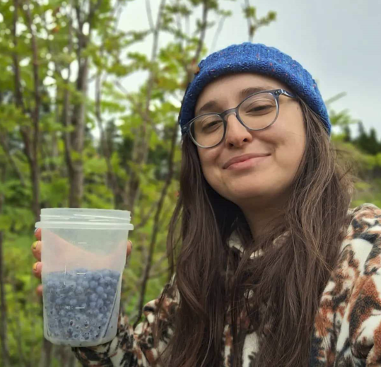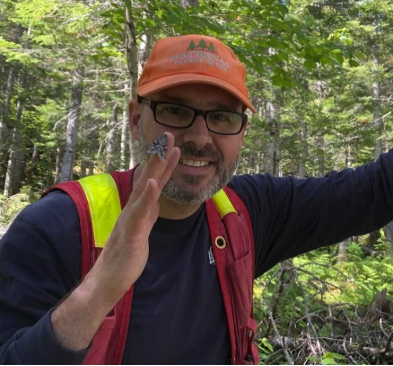By Dr. Darren J.H. Sleep and Dr. Joe Bowden
On the traditional Mi’kmaq territory of the Qalipu First Nation, near Corner Brook, Newfoundland, a new collaborative research project will study pollinator and plant diversity through a 35-year view of managed boreal forest. Undertaken by the Memorial University of Newfoundland and supported by the Sustainable Forestry Initiative, the project will employ a combination of field surveys, flight intercept traps, time-lapse cameras, and data loggers to capture a comprehensive snapshot of plants and associated pollinators across a series of managed forests. Methods of ecology, entomology, botany, and traditional knowledge will be used through the lens of “two-eyed seeing,” which integrates Western science and Indigenous perspectives to foster understanding, respect, and harmony between Indigenous and non-Indigenous worldviews. Two-eyed seeing recognizes the value and validity of both perspectives and seeks to integrate them in a way that enriches decision-making, problem-solving, and relationships. Ultimately, the project not only aims to advance ecological understanding but also foster cultural appreciation of key plant species important to Indigenous communities – referred to as culturally significant species – to support future monitoring of these species in a changing climate. The findings will inform forest management strategies while also contributing to conversations between the science, policy, and business communities at the intersection of biodiversity, sustainability, and the preservation of cultural heritage.
Spotlight on research
As the climate crisis continues, we must consider different aspects of ecosystem services and sustainable forest management to support resilience. If we take a walk in a warmer climate, will we still see the diversity of understory plants used for subsistence living by local communities and Indigenous Peoples? Will we continue to hear the constant activity of pollinators or only a few passing by every so often? How might these changes impact forest recovery? Asking these questions today will ensure that sustainably managed forests continue to support healthy ecosystems for generations.
This information is important to continue improving the SFI Forest Management standard. New research findings will help to tailor interpretation of the standard to ensure the long-term sustainability of forest management both in Newfoundland and beyond. Grassroots organizations like the SFI Standard Implementation Committees (SICs) help disseminate findings, and SFI translates them into new practices and considerations for the future of forest management in North America.
Through the financial support of the Sustainable Forestry Initiative (SFI) over the next three years, and in collaboration with Corner Brook Pulp and Paper (an SFI-certified organization), Qalipu First Nation, Memorial University of Newfoundland, the Provinces of Newfoundland and Labrador, Natural Resources Canada – Canadian Forest Service (CFS), we are excited to showcase three students working with a CFS scientist to understand post-harvest plant-pollinator relationships with culturally significant species in western Newfoundland, Canada.
The Qalipu First Nation will be involved in the project in significant ways. A Qalipu Elder, Elder Barnes, is involved in the mentorship and supervision of the students recruited for the project. Elder Barnes brings a wealth of traditional knowledge on plants of the region and a holistic perspective of the forest landscape. Kristen Pittman, Qalipu Member and Manager of Indigenous Affairs at Memorial University’s Grenfell Campus, has also been involved in every step along the way as the project’s liaison with the Qalipu First Nation. She is keenly interested in participating in community engagement plans.
Meet the team

Katelyn Corbett
Katelyn Corbett, originally from Prince Edward Island, has called western Newfoundland home for almost two decades. When she isn’t trail running or skiing, Katelyn is coming up with other excuses to spend time outside. She has a Bachelor of Fine Arts (BFA) and Bachelor of Science (BSc) degrees, and she is currently a graduate student in Memorial’s Master of Science (MSc) in Boreal Ecosystems and Agricultural Science program.
With her focus set on insect pollinators, Katelyn will be working to answer the question, “Who’s around, and what are they doing?”. Insect visitation to flowers is important for the successful reproduction of many native plant species through the transfer of pollen from flower to flower, with birds and other animals (including humans) benefiting from the edible fruits and berries that form. Katelyn hopes her work will contribute to a much-needed species inventory of pollinators in Newfoundland forests and provide some initial insight into pollinator behaviour and effectiveness in relation to flowering native plants.

Luke Fifield
Luke Fifield’s MSc project looks to investigate the diversity, richness, and composition of important edible and medicinal plants used by local communities and Indigenous Peoples. He also has a BSc in Environmental Science. When in school, Luke spends most of his days reading, learning, and pondering his research, but much of his life is spent in the forest. Luke’s passion for the outdoors started as a young boy growing up in Inuvik, Northwest Territories, where he was exposed to a way of life that was centered around the outdoors.
Luke is Indigenous and belongs to the Nunatukavut Band from Labrador. He was taught how to hunt and fish and participated in many winter activities, such as snowshoeing and cross-country skiing. After 15 years of living in Newfoundland, Luke knew that if he wanted to stay in touch with his roots and be able to spend as much time in the outdoors as he could, his education should reflect his values. He now works alongside like-minded individuals striving to protect and conserve the environment that shaped him. He is very proud to be part of such a great project and is excited for what’s to come.

Julia Keeping
Julia Keeping grew up in a small ocean-side town in southwestern Newfoundland. She holds a Bachelor of Arts (BA) and a diploma in Marine Environmental Technology. Despite living in a rural area with more green space to explore than possible, she became interested in forest research when she spent a summer in 2017 planting seedlings in post-harvest landscapes in Northern Ontario. Those familiar with this job know it’s incredibly rewarding, but not for the faint of heart! She continued tree planting for another four seasons in British Columbia before enrolling in the environmental technology program at Memorial University of Newfoundland and Labrador in 2020.
Julia has previously worked as a Research Assistant with Natural Resources Canada, where she examined the effect of climate change on economically important tree species on the island of Newfoundland. This experience led her to pursue a Master of Arts (MA) in Environmental Policy, exploring the relationship between culturally significant plants and pollinators in managed forests under climate change. Julia will be conducting a greenhouse experiment and pairing it with data to inform policy recommendations needed to address forest management in a changing climate. Thanks to the generous support of SFI, she is excited to work with the research team on this important project.

Joe Bowden
A Research Scientist with Natural Resources Canada’s Canadian Forest Service, Joe is an arthropod (e.g., insects and spiders) ecologist with a focus on boreal forest fauna. He is particularly interested in studying adaptive ecosystem-based monitoring, forest disturbance (including climate change), forest pollinators, natural enemies, and non-target biodiversity of forest insect management strategies.
We look forward to keeping you updated!